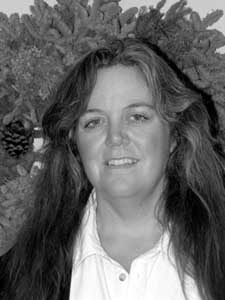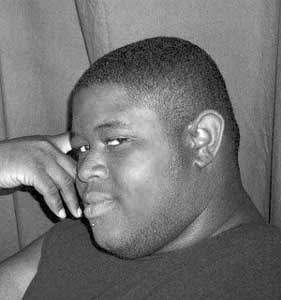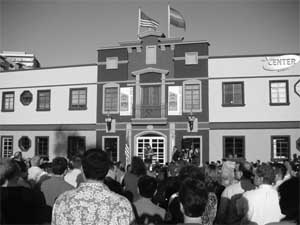-
- Golf club saga illustrates difficulty enforcing gay rights laws
- Gay bishop offers concession to conservatives over conference
- Despite state law, Massachusetts firms deny spousal benefits to same-sex couples
- The GLBT year in health
- Gay detective finds support instead of bias
- Same-sex marriage divorces begin
- National News Briefs
- World News Briefs
feature
When giving is a gift
Published Thursday, 23-Dec-2004 in issue 887
In honor of the holidays, this issue is dedicated to give and take. Anyone who regularly reports on human interest stories, as we do, will often come across volunteers who insist that they’re the ones reaping the benefits of their work – rather than their beneficiaries. So, for this year’s holiday issue we preempted that common refrain, and went in search of people in the community who are directly mixing up the give and the take in what they do. We didn’t have to look far.
Healing the spirit
When Michele Tuatagaloa, known as “Michele Eagle Woman” at The Center, figured out she was gay about two and a half years ago, she had every reason to be nervous – and she was. Having raised seven sons, including five adopted from Samoa, with her husband of 23 years, this recently retired police woman was no stranger to confrontation, and she knew that the only way forward was to find the true Michele Tuatagaloa, face her, and introduce her – gay and all – to the rest of her life.
But for Tuatagaloa the process was surprisingly smooth and even pleasant. She and her husband remain friends to this day – and their children are gradually and supportively getting on board with her new life.
“It all evolved and unfolded beautifully,” says Tuatagaloa.
Tuatagoloa’s smooth ride is largely due to the fact that her most challenging inner journey had already begun, some time before she came out.
For Tuatagaloa, that journey began in the mid-1990s in a Sedona, Ariz., bookshop, where Tuatagaloa encountered a book about a Cherokee medicine man named Rolling Thunder. At the time, Tuatagaloa was suffering from post-traumatic stress syndrome after a shooting incident while on duty that had led to her retirement from the police department in 1993. Tuatagaloa found healing in the book, and soon found herself at Rolling Thunder’s home in Carlin, Nev., where she proceeded to take care of the Cherokee leader, who by then was in his 80s, for the next four years. The experience, she says, healed her of post-traumatic stress disorder, and eventually Tuatagaloa herself was inducted as a spiritual leader into the Cherokee community.
She might have thought her spiritual journey was accomplished – but one of the biggest life challenges ever lay ahead. At a ceremony in Taos, New Mexico, inducting Tuatagaloa as a spiritual minister, Tuatagaloa got a strange sort of sign.
“I’m standing on a gorge at the mouth of the Rio Grande River,” remembers Tuatagaloa, “and in the middle of prayer, one of my spiritual insights was, ‘Throw those shoes over the edge of this cliff because who you are when you walked here is not going to be the same as the person you will be when you come back.’” Tuatagaloa stops her story long enough to laugh, and say, “I love hearin’ myself … You must think I’m crazy!”
Soon after returning to San Diego, Tuatagaloa says she began to realize that she was gay, something that had never actively occurred to her previously. And what she says then doesn’t sound crazy at all: “As a spiritual leader,” remembers Tuatagaloa, “[I thought] I can’t do it quietly, I need to fully come out to everyone within my community – to my family, to everyone – in the most honest and sincere way that I can, that brings no harm to others.”
And then came the beautiful and smooth unfolding part. Not that it was easy.
“Yeah, it’s scary,” admits Tuatagaloa, “but you have to be honest about it, and in that first calling you must answer the call. You must be honest to your true self. And I tell you right now I’m happier than I’ve ever been in my life, to be my true self.”
Today, Tuatagaloa combines her Native American leadership role with GLBT causes by leading The Center’s coming-out group for women, on Wednesday nights. In her role as a coming-out guide, Tuatagaloa’s seen many different women’s experiences. She likes to offer lesbian and bisexual women spiritual guidance from a tradition that teaches acceptance rather than judgement.
“ … Many women have been rejected by their religious paths – where their spiritual leaders have condemned them for coming out,” says Tuatagaloa. “… So as a facilitator that does have a strong belief … in a higher power, it’s very comforting for these women to know that they are loved and accepted for who they are.”
Tuatagaloa first contacted The Center both to find a supportive community of women for herself, and also to find ways of giving back. Somewhere in there, she found her current partner, Darcy, and the pair live on a residence they have named Gadohi Usquanigodi, which means “Land of Miracles” in Cherokee, where people are welcome to visit their sweat lodge, hold prayer circles or receive support from a medicine elder in the Native American faith.
“It began as a need to openly be proactive be supportive for the community,” says Tuatagaloa of her community involvement. “The community’s like a garden that needs to be nurtured and supported.”
A funny thing happened on the way to the front desk
Sally Altman and Lisa Taggart are loving San Diego.
Having moved here earlier this year, the professional couple – Altman is a technical writer and Taggart works in the biosciences industry – immediately began looking around for ways to get involved in the San Diego LGBT scene, and almost as immediately they began to notice that they loved it.
“… It seems there’s a very strong community here,” says Taggart, “so much more so than other cities and states that I’ve been in, and all-round it’s such a great place to live … We’re never lacking for anything to do.”
Question: So how is it, that while many long-time residents still find SoCal life fragmented, unsophisticated and lacking any kind of said scene, these two have found a beloved community straight off the plane from Houston?
Answer: The Center’s front desk.
When Taggart and Altman first arrived, they turned to the San Diego LGBT Center to find out what to do. First they went to a Community Coalition Breakfast featuring the theme of managing wealth. They were impressed. Next they attended a panel of lawyers’ advice on the implications of AB 205. They were even more impressed. They signed up for The Center’s newsletter, and came to this conclusion:
“In Houston,” says Altman, “they had a gay and lesbian center, but the community there was very different. All of our gay and lesbian friends we had there we met through other friends, and our Houston friends we’d known for many, many years. But once we got here in San Diego, we noticed a big, big difference. It wasn’t as insular.”
After signing up for The Center’s newsletter, they got even more excited: “… We were saying, ‘Wow! Look at all this stuff!’ We like to get involved and we like to share whatever we have with our community. So it just seemed natural to start volunteering.”
The Center’s Eddie Valtierra met them and suggested that the front desk was where the need was, so next thing the couple knew, they were answering phones.
“At first it was a little bit overwhelming,” says Altman, “because people are coming in and calling and asking a variety of questions … ‘Where are the good bars, what’s going on and how can I get involved.’
“We would get out the newspapers and look through the ads, and we had to figure it out … And the funny thing is we started seeing friends we’d already made coming to The Center for different activities and we would see them there.”
Before they knew it, they were not only crocheting and jewelry making at the Women’s Resource Center, but the new arrivals had also somehow managed to become experts on what to do and where to go in San Diego.
Now, says Altman, “We know people, we know what activities are out there, what businesses cater to gays and lesbians. …”
Furthermore, they feel they’re already contributing to the community that they so recently needed to take from: “Really we decided it was something we could do together as a couple, something that would allow us to get involved in the community, but allow us to give back as well,” says Taggart. “That’s something that was important to us, to contribute to the LGBT community. … There are so many great things that have come out of it for us.”
Now, the pair plan to join The Center, as they want their contributions to be solid, financial contributions to the brick and mortar of the organization, as well as gifts of time. They also will begin staffing the Women’s Resource Center’s (WRC) desk one night per week in January, and have taken on the task of building a new website for the WRC.
“We volunteered … a week ago,” says Altman, “and we left there thinking, ‘We really helped some people tonight.’”
They had helped, remembers Altman, a woman who had just lost her job and needed to send out resumes from the cyber center, as well as a young man who needed a specific kind of support group.
“We felt we’d helped a lot of different kinds of people,” says Altman, “just a real spectrum, and their joys and their lives. We get a lot and we give a little.”
The place and the space to figure it out
Chances are if you’re young, gay and homeless in San Diego and you dial 1-800-PLACE2STAY it’s someone like Jeffrey Evans who’s going to answer.
Evans is a youth apprentice at the San Diego Youth Services-run program The Storefront, a Hillcrest shelter that provides 21 beds for homeless youth under age 17, and serves as a drop-in center providing activities and advocacy for homeless youth between the ages of 18-24. When places like the Hillcrest Youth Center close for the day, many young LGBTs with no home make their way toward The Storefront for help with finding a job, homework, planned activities like a movie night or a drumming circle, or simply for companionship.
That’s where Evans comes in. As a youth apprentice, Evans’ job involves showing up at The Storefront in the afternoon and evenings and befriending the youth he finds hanging out there. As a 20-year-old African American who came out when he was 12, struggled with family issues through his teens and was himself homeless as recently as last summer, Evans has plenty of street cred to go with the companionship.
“I think it’s great to have a mentor your own age,” says Evans, “because you can see them going through what you’re going through. Adults often try to step in, but if you see someone from your neighborhood, or who’s your age, or who’s going through what you’re going through, it’s much different. Because you see that it’s real.”
Being a survivor of the experience of LGBT homelessness, Evans has fought the homelessness war on the frontlines, and seen it all: he’s seen the hate crimes, been victim of the gay bashings, and seen young people fall in and out of prostitution, drug problems and family rejection.
For Evans, help came in the form of programs like GYA, or Gay Youth Alliance, and his mentors there, Benjamin Ignalino and Joshua Rapp; there was also Loc Dinh, a friend and mentor; and Wayne Rafus, at Family Health Center’s In the Mix; and the Hillcrest Youth Center’s former director, Scott Gross.
“… I was lucky to have been seen by people in the community who recognized me and what I had and guided me to where I needed to go,” says Evans.
Working at The Storefront, which Evans pairs with a job at The Living Room Coffeehouse, is “very emotionally demanding. But,” he says, “in the end it pays off. … It’s a joy to see the change that happens, when it does happen.”
Evans explains that many of the youth visiting The Storefront are still “in the process of trying to reach out their hand,” and that real change comes slowly in the lives of young people dealing with drug, prostitution and STDs on top of the fact of their homelessness. But witnessing and facilitating success is heartening.
“I love what I do,” says Evans, “and I think … there are so many kids in San Diego and in this world who need help and guidance and someone to be patient with them, and [someone] who actually wants to know their story, and not to … use them and things like that.”
The big challenge, says Evans, for many of the kids entering The Storefront is to gain confidence and learn to like themselves. To help make that happen, the facility hosts quarterly events planned by the youth; hosts a variety of activities they can test out, such as a band called TNT (Thursday Night Teens), and helps them with immigration procedures and finding jobs. And for the LGBT youth Evans mentors, the journey is much the same – but with slightly different baggage.
“I believe the LGBT youth – they need the same love that anybody else needs, they need the same care that anybody else needs. But,” says Evans, “I think … even I sometimes feel different in the gay community, in the community itself, because a lot of times you get the images of these men who are buff and blonde and who look a certain way and you think you need to look that way to get attention, or to get friends, or to get people around you. It causes you to doubt yourself if you don’t look what is considered the norm.”
In Evans’ philosophy, it’s all about having the space to figure out who you are, and then learning to like that person.
“It’s all about finding yourself,” he says. “We never find out completely who we are, but we at least need a concrete idea of who we are. … I think this is a place where they can definitely find themselves, where they can definitely get in tune with who they are.”
|
|
Copyright © 2003-2025 Uptown Publications




